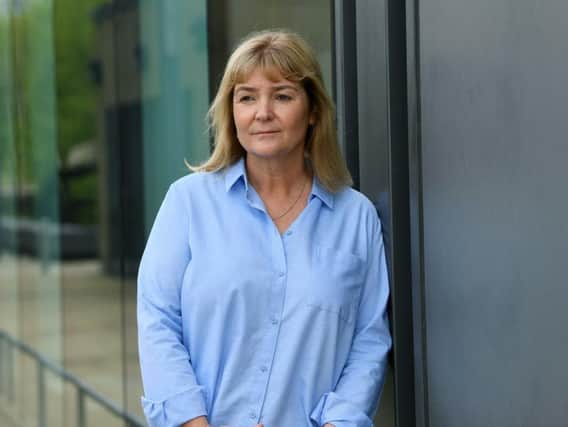We need more money, warns Yorkshire's Judy Shaw as new president of headteachers' union NAHT


On schools, on buildings, on budgets and exams. On a picture of austerity, and warnings of children with holes in their shoes. Of having to choose, between patching up the playground or paying for special needs support.
Education is in the news every day, she says wryly as she glances through her notes ahead of today’s opening speeches, yet it is seldom for the right reasons.
Advertisement
Hide AdAdvertisement
Hide Ad“We almost need a Tracey Emin-style fluorescent sign above our schools, just to say that we’re facing huge challenge,” she tells me as she tries to pinpoint where to begin.
Miss Shaw, 54, is head of Tuel Lane Infant School in Sowerby Bridge. For the first time in 31 years, she wasn’t at the school gates to greet parents this week.
She’s getting ready to head to Telford, ahead of her appointment today as president of the National Association of Headteachers. With this position comes the authority to deliver a powerful message on behalf of the region’s leaders.
Her message to the top is clear. Offerings are not enough.
“We need more money,” she says plaintively. “Headteachers, who don’t like standing on the school steps to say they can’t afford to fix the roof, are speaking out more and more.
Advertisement
Hide AdAdvertisement
Hide Ad“We are at breaking point. Teachers are taping down the carpets. They are putting out buckets, to catch the drips.
“It’s a struggle to just maintain your building, never mind enhance it for a 21st century education.
“The Government says there’s more money in education. But it’s like a shopping basket – we’ve got more money, but we have more mouths to feed.”
Tuel Lane Infants is a small school, with just over 130 pupils in an towering, Victorian Gothic building. The roots of communities are built at school gates such as these, adds Miss Shaw.
Advertisement
Hide AdAdvertisement
Hide AdShe doesn’t shy around the sums. Her school’s capital budget eight years ago for things like maintenance, she tells me, was £26,000. Now, it’s £5,000.
In Calderdale, she says, citing House of Commons library data, per pupil funding has fallen £392 since 2013/14.
Setting budgets for the next three years, she adds, the region’s schools are increasingly veering toward the red.
“We’re patching up,” she says. “In my school, for three years at least, we’ve been cutting, pruning, trimming, to get through.
Advertisement
Hide AdAdvertisement
Hide Ad“We’ve lost a teacher, who offered special educational needs and pastoral care, and 75 hours of teaching assistant time each week.
“There are fewer adults, to meet educational needs, to meet welfare needs, just to talk to the children.
“We’ve shelved plans for the playground. We’re acutely aware we should be getting our children outside for a healthy lifestyle, but we just can’t patch up that space.”
Local authorities face huge cuts under austerity funding, she says, and she understands. But she worries, she adds, about what she’s seeing in schools as that challenge feeds through.
Advertisement
Hide AdAdvertisement
Hide Ad“It’s heartbreaking,” she said. “We can identify children who might need additional support.
“But there’s a skeleton
service. The waiting lists are huge. Now we have to pay, for things like psychological or welfare support.
“I referred a child for support in Reception class, that child was not seen until Year 3. That’s four years.
“Once a child is diagnosed, they can access support. We now have to pay for that.
“As a school leader what choice do we make?
Advertisement
Hide AdAdvertisement
Hide Ad“Do we pay for that additional support, or do we patch up the playground that’s been reported as unsafe? It’s heartbreaking decisions. But of course, a child always comes first.”
Miss Shaw, originally from Lancashire, lost her father Jack Shaw last year, just weeks before his 95th birthday.
Northern to the core, she said, two things mattered to him – trade unions and schools. Education, he had always firmly believed, remained the route out of poverty.
Miss Shaw, now fuelled by
a fire that comes after decades
of patching up scraped knees, said she was always set for this path.
Advertisement
Hide AdAdvertisement
Hide AdAnd despite the challenge, she adds, teaching remains a “wonderful” job. There is so much to fight for, she says.
“We’re all grown-ups in teaching, but we still punch the air when a child spells ‘was’ without a ‘z’ for the first time,” she says.
“Schools are joyful places to be. They have to be. There are massive challenges out there, possibly greater than ever before. But we must stay positive and optimistic.
“My joy is in that space,” she adds. “Watching a teacher share one small lesson, and a life is changed.”